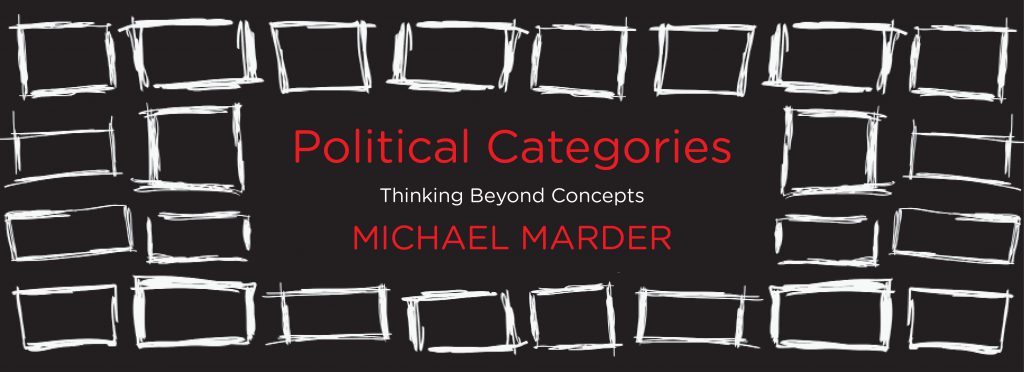Position as a Political Category: Phenomenology and the Eroticism of Power (Part 1)

“In a political world where simplistic reductions tend to reign, Marder offers a thoughtful reconsideration of categories as offering greater descriptive power and critical complexity than concepts that suppress the specificity of political phenomena. This is an important book that gives us both the example and the ideal of a political philosophy tasked with understanding the field of conflict in the service of an expansive pluralism.”
~ Judith Butler, Maxine Elliot Professor of Comparative Literature and Critical Theory, University of California, Berkeley
This week we are featuring Political Categories: Thinking Beyond Concepts by Michael Marder. In this book, Marder proposes a new methodology for political science and philosophy, one which he terms “categorial thinking.” Under this lens, the political appears not as a singular concept but as a family of categories, allowing room for new, plural, and often antagonistic ideas about the state, the people, sovereignty, and power. Today is the first of a two- part post in which Marder discusses the phenomenology and eroticism of power.
Enter our drawing for a chance to win a copy of Political Categories!
• • • • • •
Two motivations guided my writing of Political Categories. The first, revealed in the preface, was the need to outline the defining features of politics in the face of a neoliberal assault that purposefully and systematically conflated this domain of human activity with economics. The second emerged in the measure in which the book’s argument unfolded: the desire to recover political experience, or, more precisely, politics as a matter to be experienced in its institutional and revolutionary, formal and informal, variations. Succinctly put, I aimed to elaborate a phenomenology of res publica, to which all things political, and even those usually set outside the political sphere proper, referred.
While the theoretical pillars for my work were Aristotle’s and Kant’s reflections on the categories, my constant interlocutor—indeed, a philosophical frenemy—was Carl Schmitt. It may not be obvious, but the very title of the book is polemical: it suggests that political categories offer a better, more nuanced, vigorous, and flexible approach than Schmitt’s “the concept of the political.” I do not, in fact, believe that there is such a thing as the political. To my taste, the term is too vague and abstract to be meaningful; it befits an eviscerated politics, shorn of res publica and its corresponding experiences. Together with the concept, the political dispenses with the irreducible plurality of politics, the plurality we may access by resorting to the categories that do not, taken singly, exhaust the complex meaning of the things they comprehend. I much prefer politics—a noun saddled with multiple and frequently contradictory senses thatare still connected, in one way or another, to actual practices and everyday life.
“The clashing camps that endorse diametrically opposed positions are utterly predictable in their argumentation, and much of the 24-hour news cycle is based on replaying them over and over again.”
In the brief remarks that follow, I would like to zero in on one of the Aristotelian categories and, in the spirit of the phenomenology of res publica, elaborate its relation to the question of sexuality and the eroticism of power. That category is positionality. The germs of the elaboration are scattered throughout Political Categories, especially in the chapter dealing with the state. Here, I want to flesh it out further in light of the sexual ontology of individual bodies, those of entire groups, and of the body politic.
When we hear the word position in a political context, we immediately interpret it as a demand to situate oneself on a spectrum of practical options in response to a certain problem or question. These options are not the expressions of ideas but of worldviews and opinions that, typically polarized, become so banal (if emotionally charged) as to turn into something like caricatures of themselves. What is your position on abortion? On universal healthcare? On migrants? The clashing camps that endorse diametrically opposed positions are utterly predictable in their argumentation, and much of the 24-hour news cycle is based on replaying them over and over again.
A more phenomenologically grounded approach to political positionality has to do with the division between the right and the left. Although these designations refer to the ideological differences among the adherents of various positions, they stem from the spatial arrangement of the French National Assembly in the aftermath of the 1789 Revolution. There, the deputies sat to the two sides of the president’s chair, to its right or to the left, according to their allegiance to the king or the revolution. A lived orientation underpinned the division: positions of bodies in (a politicized) space were imbricated with political positions and reflected in miniature the position of the body politic.
“The recent collapse of centrist parties and coalitions all over the world renders the political positions “left” and “right” meaningless.”
In the absence of the monarch (and, later on, with the decline of centralized authority), positional markers survive their initial phenomenological raison d’être. To us, the point of reference in the question to the left and to the right of what? is the center, a fluctuating agglomeration of the widest possible consensus situated between the ideological extremes. The recent collapse of centrist parties and coalitions all over the world renders the political positions “left” and “right” meaningless. It completes the process of decoupling them from their experiential foundations—the process, which has been ongoing for over two hundred years that have elapsed since the French Revolution.
What interests me, nonetheless, is the embodied positionality of political groups and their members. The state, for one, is at the semantic and at the symbolic levels, a political unit in a standing position. Its status is that of something erect. Confronted with the state, its own citizens must assume a passive position: they must lower themselves in comparison to the power transferred to and accumulated in the institution. The citizens are on the receiving end of the state towering over them, unless the sovereign fails to fulfill its protective function, in which case rebellion is justified. That, in a nutshell, is Hobbes’s take on the matter.
“Evidently, the position of the state is phallic. But its never-ending erection is as much an instrument of authority as a seed of its demise.”
Evidently, the position of the state is phallic. But its never-ending erection is as much an instrument of authority as a seed of its demise. Always standing, the state does not respect energy cycles, whether they are sexual or cosmic: the period of relaxation that follows the phase of excitation; the rotation of planets, colloquially and experientially expressed, for example, in the rising and setting sun. The state cannot afford to change positions, despite all the rhetoric surrounding the decentralization of its power. It is a faithful inheritor of a phallic solar fetish in politics—of the Sun King who morphs into the sun that “never sets over the British Empire.” Never setting or sitting, never going down, state sovereignty is all-powerful and, by the same token, powerless: exposed in its perpetual genital display, even if the exposure is meant to be blinding (and so, concealing) in its solar brilliance. Compared to sitting or lying down, standing is also a position that is less stable, less supported by a solid stratum, which, in the last instance, has to do with the earth. As such, the one standing is more prone to overthrows in a confirmation of the common wisdom, proclaiming that what has come up must, at some point, go down.
While in relation to the state citizens assume a passive and lower position, as its representatives they stand up and, regardless of who they are, are rendered phallic. We should interpret “a standing army” in this vein. The admission of women into army ranks is, therefore, not as an advance in gender equality, but another mode of submission—by identification with phallic authority. Curiously, Trump’s objections to transgender people serving in the US military impose a discriminatory, but, perhaps, also an enabling limit on this process of identification. Trump denies a particular group a “standing” (the legal translation of the state’s erection); he puts in doubt the very possibility that it can stand, that it can threateningly expose itself—as who or as what?Effective resistance, then, should not buy into the typical liberal demand to be accepted into a proudly erect center. Instead, it should take another position (sitting, or lying down: we will turn to these in a moment) from which to undermine the dominant standing.



